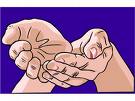
I've made this thread in order to assist the many heart broken individuals we get posting threads in this section. Getting over a lost love is quite a hardship and one can be very confused, emotional and in such pain that they are unable to rationalise the situation without some form of outside help.
I've seen many threads where a person is told to "just get over it" etc and is treated quite harshly when this is not at all the way to deal with such people. I myself can attest to how it feels to experience the highest highs of love as well as the lowest of the lows and then to lose it all. This harsh treatment almost always comes from those who have not experienced the same situation and my advice to those who seek to advise another but cannot help but to be harsh, is that they should simply stay silent and leave it to those who will show some compassion and patience. (I remind myself before others, inshaa'Allah.)
I found an article which, I believe has some excellent tips for those who are lovesick and thought sharing it would be a good idea. I hope this thread can help those who are suffering from heart break to understand better their situation and the whirlwind of emotions and then give them the push they need in order to move on and continue with life stronger then they were before, inshaa'Allah.
Step 1: Accepting Allah’s Qadr
This has got to be one of the toughest tests of qadr. Love muddles your mind and when all you see are the good characteristics of someone it is difficult to see why it is not working out, especially if this is your first real love. How can this brother who is practicing his deen, has a nice beard, soft and caring be wrong for me? How can this sister who is attractive, fun and religious not be my perfect partner?
The key concept to remember here is: you do not know someone until you have lived with them for a substantial time. Even that person does not know what they are like and how they will react in certain situations. Just because you have these elated feelings of love does not necessarily mean this is the right person. Marriage is a struggle and people develop themselves and change with the experience. Only Allah knows your compatibility, only Allah knows what situations you will face and your reactions. Only Allah knows whether or not this marriage will bring you closer to Him or distract you from the real purpose in life. It is only Allah who knows. Have trust in Allah that He has made the right choice for you. For no matter how much this person claims their love for you or vice versa, know that no one can love you as much as Allah.
So firstly, make dua to Allah to ease your pain and help you be content with His qadr. The following is my favorite Hadith regarding qadr as it really fills you with the awe of Allah and His infinite wisdom.
“Allah `azza wa jall said: ‘Verily, from amongst My slaves is he whose faith cannot be rectified except by being inflicted with poverty, and were I to enrich him, it would surely corrupt him. Verily, from amongst My slaves is he whose faith cannot be rectified except by wealth and affluence, and were I to deprive him, it would surely corrupt him. Verily, from amongst My slaves is he whose faith cannot be rectified except by good health, and were I to make him sick, it would surely corrupt him. Verily, from amongst My slaves is he whose faith cannot be rectified except by disease and illness, and were I to make him healthy, it would surely corrupt him. Verily, from amongst My slaves is he who seeks worship by a certain act but I prevent that from him so that self-amazement does not enter his heart. Certainly, I run the affairs of My slaves by My Knowledge of what is in their hearts. Certainly, I am the All-Knower, All-Aware’.” [Tabarani]
Step 2: Awareness of the love-drug syndrome
An interesting study was conducted comparing drug users to people who claimed to be “madly in love”. They found that brain scans showed people who are in the first stages of love and people who are high on cocaine have the same areas of the brain stimulated while looking at a picture of their “beloved”. In other words, being in the first stage of love is similar to being high on drugs! With drugs, you are not in love with the powder itself – you are in love with the feelings that it gives you.
Similarly, the thing that we love is the special attention, the butterflies in the stomach, the acknowledgment that someone cares about us in a special way, looks at us in a special way, thinks about us in a special way – the constant day dreaming about the future and daily scenarios. So it is not that this person is perfect, it is that this person allows us to feel all these emotions which are addictive. In reality we are not in love with the person, we are in love with Love itself.
Being in love with Love explains how some people overlook major faults in their prospective spouse. I knew a practicing sister who wanted to marry someone who had a drug and alcohol problem. This was because in both cases these “faults” were discovered during the first butterfly phase of love and not before. Alhamdulilah, by the qadr of Allah the marriage did not take place, but it was due to circumstances, not because the sister had realised that they were not a suited match.
Awareness of this love-drug syndrome has two major benefits. Firstly, awareness is power and it breeds hope. Once you are aware that it is the feelings you are attached to, realise you can actually get them elsewhere.
These feelings are not specific to this one person; you will get these feelings with your new, more suitable prospective partner – the one that Allah will put into your life at the right time insha Allah. Love clouds your mind and makes you think that you will not find this strong love and passion with anyone else. But this is simply not true. You will find this love to be even stronger and more passionate with the right person (the one that is written for you in the Lahw al Mahfooz).
The second benefit is knowing that just like a drug-user naturally has withdrawal symptoms when they stop, you too will naturally have withdrawal symptoms, and it will be difficult. Getting over someone is emotionally painful so don’t be too hard on yourself, validate your feelings and allow yourself time to heal. Know that this is common – nearly everyone goes through heartache at some point in their lives, and eventually recover with time.
As a side point: It is not a sin to fall in love; it is a natural emotion which the human species depends on! If you did sin in the process then repent to Allah, He is the Most Forgiving, Most Merciful. Love is a powerful emotion, which is why there are boundaries in Islam. If you have fallen outside those boundaries, repent and move on.
Step 3: Be proactive
Allow yourself time but also get proactive! Marriage is just one of the many aspects of your life; it is not the be all and end all of things. What are your aspirations? What do you want to achieve in your life? Write down a list of goals you want to achieve by the end of the month and get started on them right away. As Muslims, our continuous goal is striving to get closer to Allah, so working on your eman and your relationship with Allah must be included in some way. Focus your attention on moving forward rather than wasting time with something that “could have been”.
Step 4: Move on
In the spirit of being proactive, the last stage is to actively open your heart and mind to someone else. This could be difficult, as naturally comparisons will creep in, but again realise the fact that it has not worked out means that Allah has someone better suited for you. As illustrated in the famous Hadith of the birds:
“If you depend on Allah with due reliance, He would certainly give you provision as He gives it the birds who go forth hungry in the morning and return with a full belly at dusk.” [Tirmidhi]
Allah will provide for you but you have to get up and get moving again. Just like the birds, go out and seek. Make the effort on your part and leave the rest to Allah and His infinite wisdom.
Source: http://islamic-quotes.blogspot.com/2011/02/if-you-are-suffering-from-broken-heart.html
Allah will ask on the Day of Judgment: “Where are those who loved each other for the sake of My glory? Today, on a day when there is no shade but Mine, I shall shade them with My shade.”(Muslim)






